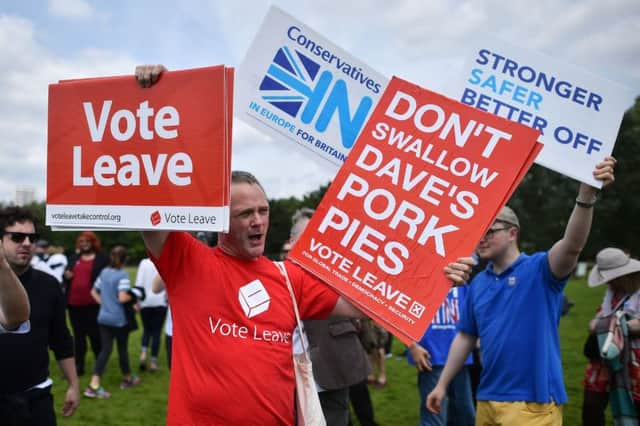Russell Barr: Time to overcome EU referendum bitterness


For everything its season and for every activity under heaven its time, a time to plant and a time to uproot, a time to tear down and a time to build up.
These are the words of Qoheleth, author of the Biblical book of Ecclesiastes, and although they come from ancient times, their sentiments could hardly be more contemporary as the ramifications of the Brexit vote continue to shake the political, economic and social foundations of the United Kingdom and our European neighbours.
Advertisement
Hide AdAdvertisement
Hide AdQoheleth was someone who lived in troubled times, and as he thought long and hard about what was happening in his own life, and the life of his nation, Qoheleth struggled to understand and make much sense of it all.
However you voted in the EU referendum, and whether or not you are pleased or disappointed by the outcome, it is evident years of uncertainly lie ahead and in the last few days we have all heard the hopes and fears of many people struggling to make sense of what has happened and why and wondering what will happen next.
Like Qoheleth, we too are living in troubled and troubling times.
The seeds of what became the European Union were planted in the immediate aftermath of the Second World War as the world’s leaders sought to bind the European nations together in such a way that they would no longer resort to war to resolve their differences.
Too much blood had been spilled and too many lives had been lost for things to continue as they were and last week’s commemoration of the centenary of the Battle of the Somme is a painful reminder of the conflicts which once engulfed Europe.
The Brexit vote means something of what was planted after the Second World War is now being uprooted, and if the United Kingdom’s decision to leave the European Union will take time to work out, so too will the implications of the debate itself. With its personal attacks, its deceitful claims and promises, its shameful slogans, posters and fear-mongering, both sides of the debate have left a toxic legacy of suspicion and mistrust and the situation has been compounded by the paucity of leadership from the Conservative and Labour parties as they have turned in upon themselves.
So where is wisdom to be found?
Qoheleth was someone who believed passionately in the virtue of wisdom and there is much wisdom to be found in his profound insight into the rhythm and pattern of life; that just as there is a time to tear down there is also a time to build up.
If the “tearing down” stage of the UK’s relationship with the European Union is where we find ourselves at the moment, and already it is evident that the process is going to take years to complete, drawing on the rich history of Christian spirituality let me suggest a number of things which will help the “building up” again of the UK’s sense of itself and its relationship with its European neighbours and the wider world.
We need to breathe deeply.
Advertisement
Hide AdAdvertisement
Hide AdWhether it is Iona or Lindisfarne or Santiago de Compostela, the Christian community has long grasped the value of pilgrimage and the importance of taking time to think and ponder and wonder and pray. Although there is a natural human instinct for quick answers, we would do well to recognise the complexity of the situation in which we find ourselves.
There are no quick answers and so there is wisdom in breathing deeply, thinking, conferring, wondering and praying about the direction we want to take and how best to take it. Our children and grandchildren, as well as those of our neighbours on the European mainland, are going to live with the consequence of our decisions and we owe it to them to do this well.
We need to listen carefully.
Perhaps the best advice given me by one of my supervisors when I was training was to point out I had one tongue and two ears and as a minister I should listen twice as much as I spoke.
In the weeks preceding the referendum it became evident that many people felt disillusioned with politics and politicians. Time and again we heard views being expressed which spoke of disaffection, of people feeling that those in positions of power and authority were not listening to their fears or concerns.
Do you suppose that deep sense of disaffection will have disappeared as a result of the Brexit vote?
There will be wisdom in listening carefully, especially to the people who have been left feeling voiceless and powerless over what has been happening to their local communities.
Finally we need to embrace diversity.
One of the repeated accusations levelled at Jesus was that he mixed and ate with the wrong sort of people. It was an accusation which takes us to the heart of the Christian gospel because, as Jesus healed a centurion’s servant, accepted a drink of water from a Samaritan woman and invited himself to the home of a tax collector, it became evident the grace and love of God knows no boundaries. If the occasionally xenophobic tone of the referendum debate and the “hate” crimes which have followed tell us anything, they tell us we have work to do to change the narrative, to help people see not what separates us but to see the common humanity which unites us.
None of this is easy but if we can learn to breathe deeply, listen carefully and value one another then I am confident we will build up what is wise and just and good for ourselves and for our world.
• Rt Rev Dr Russell Barr is Moderator of the General Assembly of the Church of Scotland